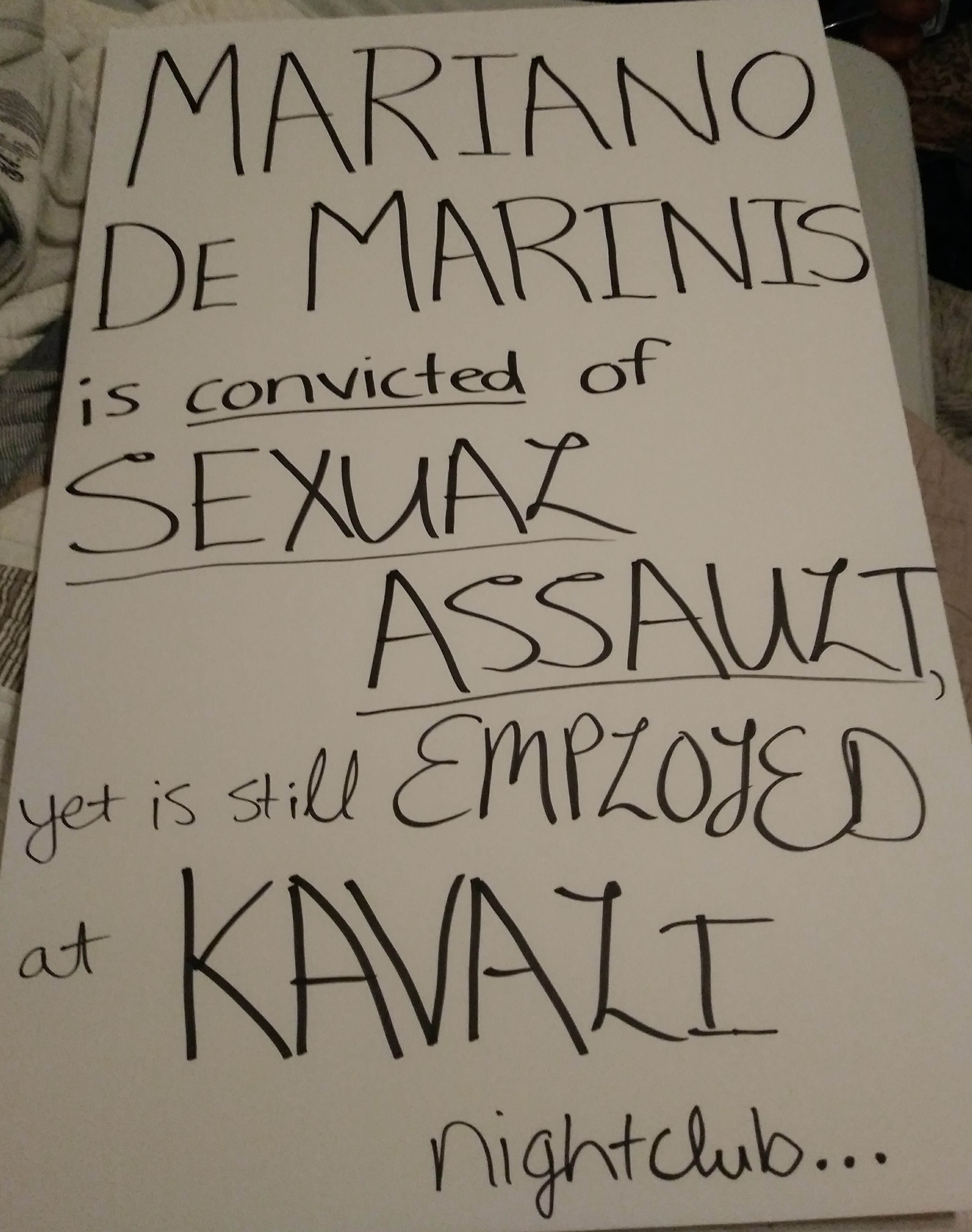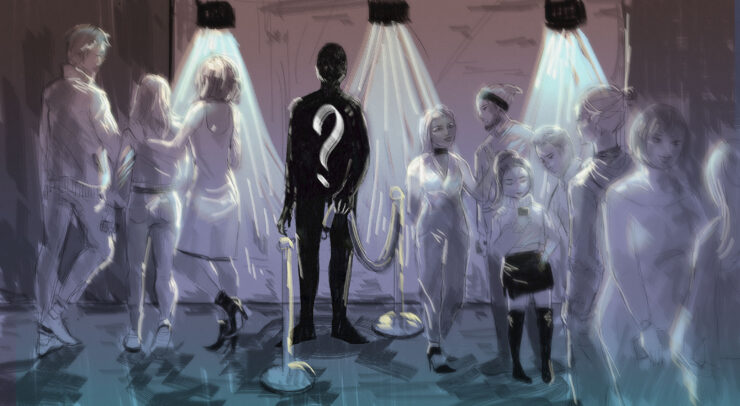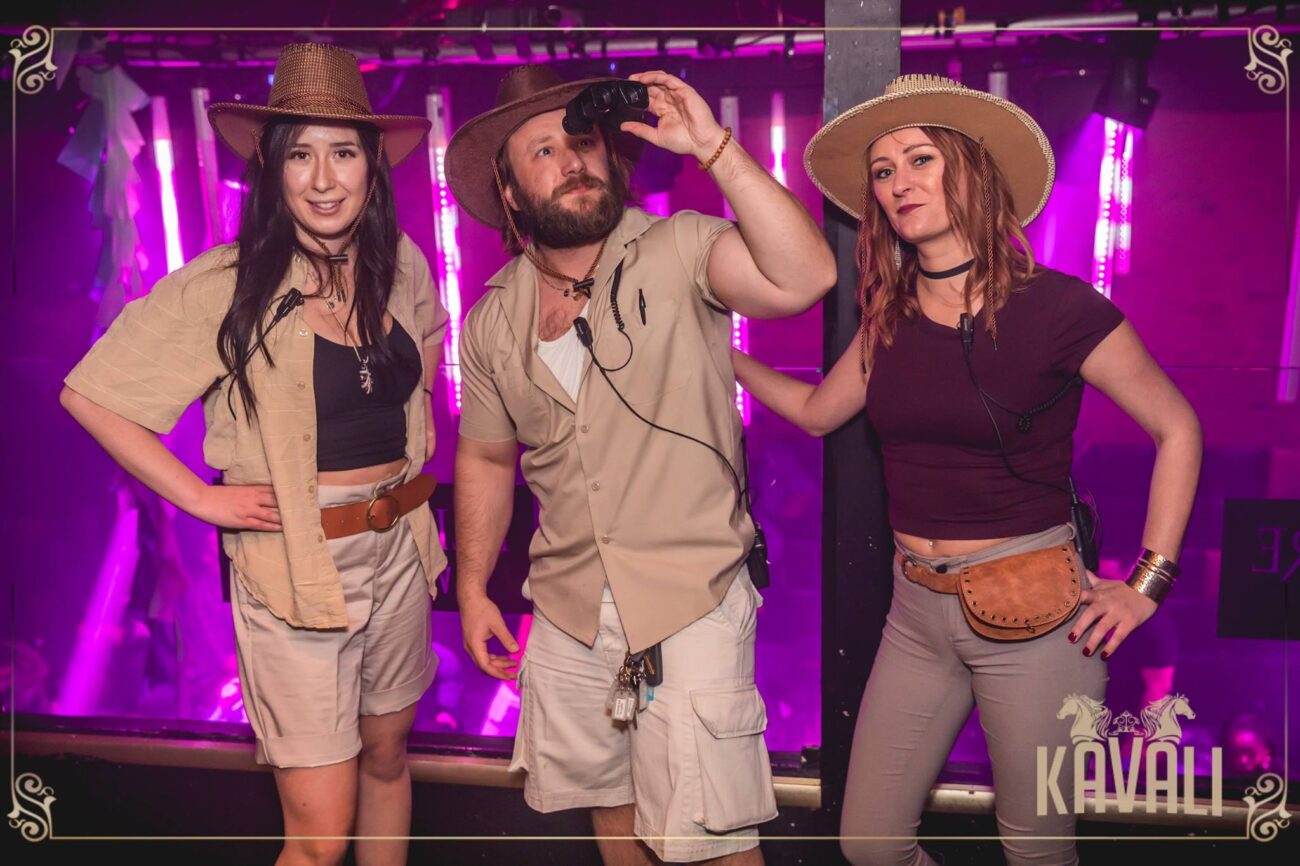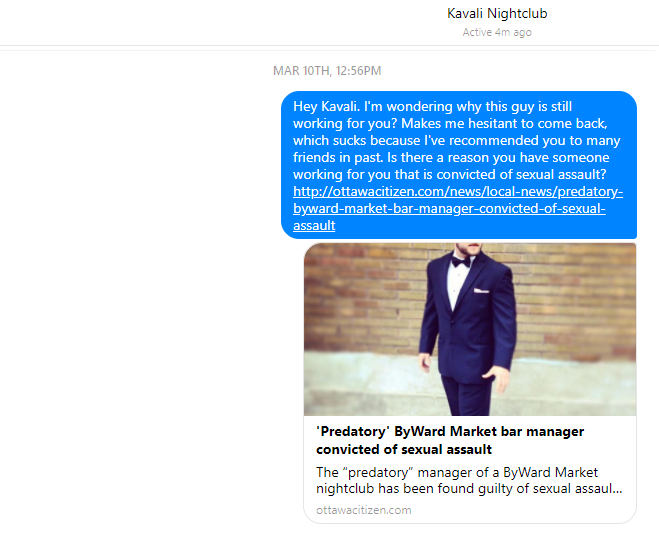What I learned about #MeToo by spending the night outside the club, alerting guests to what they’re supporting
Content warning: Rape/sexual assault.
Update: Since this article was published, Mariano De Marinis has been removed from his position as general manager of Kavali nightclub.
It was around -12 degrees out on the night of March 17, when I walked to ByWard Market. I was headed to the club, my makeup done just right, friend in tow. Carrying a sign with the words “Mariano De Marinis is convicted of sexual assault, yet is still employed by Kavali nightclub…”.
It was a slightly abnormal night out, I’ll admit. My destination was Kavali nightclub, and my goal wasn’t to get a good buzz on, but to tell people the facts about a business they were supporting and gauge the reaction.
It was an interesting social experiment, to say the least.
The #MeToo movement has taken over headlines as of late. As much as many seem to welcome the revelations of sexual violence in public discourse, there has been a very vocal section of the press that seems to believe it has become a takedown movement aimed at powerful men.
This is the theory I was hoping to test. If a man faced the justice system and was convicted of sexually assaulting his employee in training, then given a pass by his employer to work in the same scenario in which the assault occurred, would the allegedly all-powerful court of public opinion really be the last nail in the coffin?
Understanding what Kavali has condoned by employing De Marinis
According to the testimony of a woman, whose name is protected under a publication ban, in spring of 2015 she was being trained as a new employee under De Marinis. She testified that she had consumed 10 shots of tequila or Jack Daniels, and she soon felt that she needed to vomit.
But according to her testimony, when she went to the bathroom, De Marinis followed and proceeded to penetrate her vagina, although she was too drunk to consent. Throughout the trial, the woman recalled “being confused, unable to resist, blacking out and feeling unable to move,” according to presiding Justice Calum MacLeod.
MacLeod further noted that by using his position of authority, De Marinis perpetrated “the worst of kind of sexism.”
The court heard that during the week before the sexual assault, De Marinis asked the woman whether she carried nude photographs on her phone, and made a suggestion that she didn’t need to wear underwear to work.
The victim testified that she was not really surprised by these advances, given that they can be common in the bar industry, but went along with it—she had simply wanted to get the job.
De Marinis working at Kavali nightclub on March 10 (left), Jan. 4, and Jan. 29. Photos: Retrieved from the Kavali nightclub Facebook page.
“Google how big of a slut this fucking girl is”
When it came to facing the truth about what they were supporting, the reactions from Kavali club-goers ranged from women leaving the line to tell me that my sign worked, to other women yelling at me about how big of a “slut” the victim of De Marinis’ sexual assault is.
And yes, they told me to “Google how big of a slut this fucking girl is.” If you don’t believe me, listen to the audio file below.
Audio PlayerTo no one’s surprise, Kavali’s staff weren’t too pleased I was alerting people to the manager’s criminal record, and they called the police about 30 minutes after I began occupying the sidewalk. The officers spoke to the club’s staff, then returned and told me I had the right to be there, and to try and stay warm.
A week prior to my outing, I had messaged Kavali on Facebook to try and understand their reasoning for employing De Marinis post-conviction. They left me on read all week, and I didn’t get a reply until a few days after my club-protest stint.
“Hi Savannah, are you intimately aware of this case outside of what was printed in papers?”
When I asked what detail had been omitted from court records and newspaper reports to make De Marinis’ employment less concerning, they did not provide an answer and instead told me that “this is obviously a delicate matter for everyone.”
They also said they would be speaking to the manager and owner, and would update me accordingly. However, as of this publication, both the Kavali Facebook page and the nightclub’s owner, Aydin Kharaghani, have not provided any further comment.
My conversation over Facebook with the Kavali nightclub page.
The problem doesn’t end at Kavali
While researching the Kavali case, it quickly became clear how pervasive the issue of sexual assault is in Ottawa’s bar and nightclub scene, for both staff and guests.
After I reached out on Twitter to find others who experienced sexual assault in the ByWard Market, it was only a few hours before two women came forward. One common theme in both stories was how utterly unconcerned the bar staff were when these women reported the incidents.
In Ev O’Driscoll’s case, the bouncer had witnessed her assault, but laughed it off and told her to “stop crying and go have fun.” This comment was made after a man grabbed O’Driscoll from behind, twisted her arm behind her back, pressed her head against the ground, and whispered “We’re going outside,” shoving her towards the door.
O’Driscoll says her rotator cuff was torn during her assailant’s twisting her arm and her struggling to get away, but she also feels lucky that he at least didn’t get her outside of the bar.
“I spent six weeks going to physiotherapy three times weekly, and was lucky I didn’t require surgery,” she recalls. “I am amazed that no one helped me, and several people mocked me.”
Another woman, Jordan, experienced sexual assault at the same ByWard Market bar as O’Driscoll.
“It was a particularly packed night and two long lines of people were passing in one of their narrow corridors, a man grabs my breast as he walks by,” recalls Jordan. “I shove him and say ‘what the fuck, man, don’t touch me.’ He grabs me by the throat, and pushed me against the wall and told me I liked it.”
Although she tried to alert the bar’s security team, they brushed her off, telling her it was too busy for them to do anything about it.
What struck me about these stories, is that the staff were just unfazed by the women’s concerns. To hear that someone in the bar had sexually assaulted one of the guests, seemingly was just another night on the job.

Has the #MeToo “tsunami” gone too far, or not far enough?
Although I heard some memorable things on that freezing night, the most interesting reactions above all were from people lined up who expressed disgust at De Marinis’ employment, but still went into the club.
When faced with a fact that made them cringe, these guests still went on in to support the establishment employing a sexual predator, despite the many proximate bar and nightclub options available to them.
To be clear, my goal was not in the slightest to divert people from attending Kavali nightclub, but to observe whether people would still support an establishment knowing that it employs a man convicted of sexually assaulting another employee.
Although many like to talk about their solidarity with the #MeToo movement, if this night on the town taught me anything, it seems that some draw the line when talking about sexual violence puts a damper on their fun night out.
As a woman I’ll choose to put under the alias “Google how big of a slut this fucking girl is” said to me, holding an ugly fact about the owner up to the potential guests “isn’t stopping the sold out crowd inside.”
Maybe she’s right. And if she is, maybe #MeToo isn’t the “tsunami” of change that many have made it out to be.
Christie Blatchford wrote on the #MeToo movement for the National Post that, “there simply is no reputational recovery from allegations of sexual assault or harassment.”
But if it’s that easy to keep your job as a bar manager, and have a “sold out” club, even when guests are aware that you’re a convicted sexual predator, one has to wonder if #MeToo has gone too far, or if it hasn’t gone far enough.










